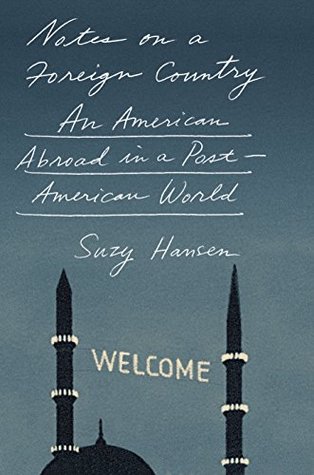More on this book
Community
Kindle Notes & Highlights
by
Suzy Hansen
Read between
September 27 - October 16, 2021
Luce and his magazines had a similar kind of impact as Roger Ailes and Fox News. He often threatened anyone who didn’t despise the enemy as much as he did, once even warning John F. Kennedy’s father that if the president showed “any sign of weakness ‘toward the anti-Communist cause,’ then Time Inc. would ‘clobber him.’” Herzstein recalls that Robert M. Hutchins, the president of the University of Chicago, once argued that Time Inc. did more to mold the American character than “the whole education system put together.”
Baldwin once explained that what he meant when he said Americans lacked a sense of tragedy was that they couldn’t grasp that life itself was a risk, that there was no such thing as safety, that eventually we all suffer and die, and that the acceptance of this fact is precisely what empowers us to struggle and endure. Black spirituals, he said, conveyed this sense of tragedy.
IN THE 1950S, Lerner had spent months in the Turkish Anatolian town of Balgat in order to study how new methods of media and propaganda could induce Turkish villagers—and uneducated peoples all over the Middle East—to embrace the United States as the quintessence of modernity. An epigraph from André Siegfried appears early in the book: “The United States is presiding at a general reorganization of the ways of living throughout the entire world.”
Some fifty years later it emerged that the American journalist was most likely killed by Greek thugs hired by the Greek regime, which was covered up with the assistance of American embassy staff, high-ranking CIA officials, and even American journalists. Every year, awards in George Polk’s name are given to American journalists—I had friends who had been recipients—but never had I heard anyone mention that one of the most prestigious American journalism awards was in the name of an American journalist who had been silenced with the collusion of his own country.
The rest of the American money went to the military, with which the Greek government began a series of emergency measures to purge Communists and disloyal citizens from society. On some of the thousands of islands strewn across the Aegean Sea, the Greeks constructed internment camps, where citizens were “reeducated” and forced to renounce communism. The government tortured them with truncheon beatings, and gave them electric shocks, and bound their skin with wire. So-called and supposed Communists—or anyone who criticized the regime—were regularly executed, cities locked down under curfews.
...more
In the countryside, the Greek military launched offensives against the villages of these rebels, with the help of U.S. intelligence agents and napalm bombs. What the Americans did not know, the Greeks never forgot; a Communist Party member told me in 2010 that the Americans “first tested” napalm on the Greeks (it was after they used it on the Japanese during World War II).
Those years also saw the first counterinsurgency operation in America’s history led by the fledgling Central Intelligence Agency, which in turn trained Greek intelligence agents in counterinsurgency and interrogation “techniques.”
We boarded the plane, and finally cut loose from strange Dubai, where the sky and the water melt into an aluminum-hued oblivion. Dubai had recently become the world’s most disreputable construction site. Now it served as the Kabul elite’s vacation spot. Western war profiteers cooled off in Dubai hotel pools and the Afghan criminal elite bought houses on a man-made island shaped like a palm. They were buying up the waterfront property, one resident told me, in anticipation of the day Kabul collapsed.
Kabul, landlocked, ringed with improbably steep mountains, felt like a defiant fortress with its inhabitants peering out into the wild. A fragile, jagged peace saturated the everyday life, as if the manic effort to house, feed, and protect the executors of the war mostly amounted to staving off the chaos outside. Someday, America in Kabul would vanish. It was impossible to imagine what the city would look like when it did.
An Afghan woman would eventually warn me of the differences between Afghans and Americans. Often, she explained, Afghans politely lied to their Western patrons about their true opinions, refraining from leveling criticism out of courtesy. Americans took everything at face value. Communication broke down for cultural reasons. I was told this, yet for my first days in Kabul, part of me still believed one thing the Afghans said—that despite our many failings, they hoped the West wouldn’t leave. I couldn’t help it; they all said the same thing.
Kapuściński seemed to have been writing about the imperial bloodlust of the Islamic State when he said almost forty years ago, of revolutionary Iran: “A nation trampled by despotism, degraded, forced into the role of an object, seeks shelter, seeks a place where it can dig itself in, wall itself off, be itself … This is why the gradual rebirth of old customs, belief, and symbols occurs under the lid of every dictatorship—in opposition to, against the will of the dictatorship. The old acquires a new sense, a new and provocative meaning.”


